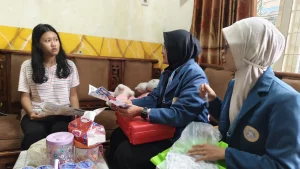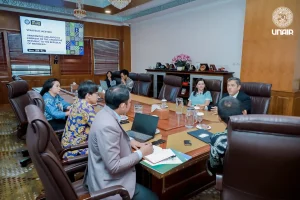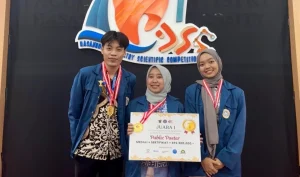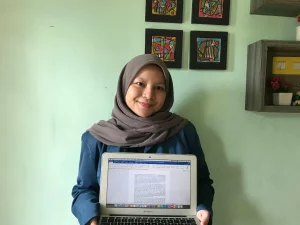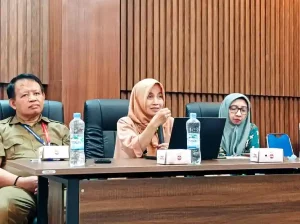UNAIR NEWS – The eco-friendly product called Excelzyme produced by UNAIR’s researcher, Prof. Dr. Ni Nyoman Tri Puspaningsih, M.Si. and her team, will be mass produced soon. PT. Petrosida Gresik is ready to fully support. The agreement of mass production between UNAIR and PT. Petrosida Gresik was stated officially on Wednesday, March 8, 2017 in the plenary room, Management Office Building UNAIR.
Prof Nyoman said that Excelzyme is a registered trademark. It refers to her team’s finding on an enzyme with lots of uses. Excelzyme itself consists of enzymes combination useful to maximize the agricultural waste which is rich in lignocellulose.
The material of Excelzyme is acquired from areas with natural resource wealth in Indonesia. So this product created by Prof. Nyoman and her researchers in Proteomics Laboratory in the Institute of Tropical Disease is aimed to make the most of Indonesian potentials.
Prof. Nyoman said that this research has been conducted since the 90’s. It was started in 1999 and it is still making progress until now. In 2007, its commercial use was started but only to a limited scale. In 2011, the patent was issued and followed by the production formulation patent issuance in 2016. Its development has been running for at least 17 years.
Excelzyme product has four varieties. Excelzyme 1 (supporting the deinking process in paper recycle), Excelzyme 2 (supporting in organic feed production), Excelzyme 3 (supporting in organic fertilizer production), and Excelzyme 4 (it is still under development, used to reduce lignin and applied in paper industry or other industry using wood). “Exelzyme was created as a contribution to the ecofriendly industry. With our product, the uses of chemicals for some procedures can be minimized,” stated Prof. Nyoman.
The paper recycle process generally uses chemicals. The industrial waste causes environmental problems. With Excelzyme, chemical uses can be limited and the result of recycle process is also better.
With this applicative finding, Indonesia is ready to stop relying on imported enzyme. Prof. Nyoman said, the price of enzyme with similar functions as Excelzyme can reach Rp 150 – 200 thousand while the product developed by UNAIR is much cheaper than that.
It means that the nation can be self-supporting in this field and it is logical and realistic to be achieved. Even though it will take a lot of time and processes, it can be done as long as the academic and industrial sector serious in developing the product. One thing for sure, Indonesia is undeniably wealthy of natural resources. It should be optimized for the national welfare.
“The university or private sector or other parties with a vision of self-supporting nation, should have concern to research, especially the one conducted for a long time, with consistency and applicative results because research takes long series of processes,” she added.
Appreciated by Many
To explore the local natural resources through enzyme development and to use the agricultural waste for agri-industrial development is the activity of Prof. Dr. Ni Nyoman Tri Puspaningsih, Dra., M.Si. with her team in Proteomics Laboratory of ITD UNAIR. Excelzyme, the trade mark they use for their applicative finding was appreciated by the Director of Industrial Technology Development Dr. Eng, Hotmatua Daulay, M.Eng, from the Ministry of Research, Technology and Higher Education (Kemenristekdikti). Hotmatua responded positively to UNAIR success in developing products from their research to be mass produced and be useful for industrials and the society. “It is the right answer to face competition,” stated Hotmatua.
The President Director of PT Petrosida Gresik Hery Widyatmoko also gave his positive response. He believed that the product will make a great contribution to the society as well as promote optimism towards the idea of self-supporting nation. “We will always support the development and research from this idea,” he said.
UNAIR Rector Prof. Dr. M. Nasih, S.E., M.T., Ak., said that there are a lot of UNAIR researchers with excellent products. They are ready to be mass produced in a great industrial scale. “We are committed to produce ideas, concepts or findings with applicative and direct use in the society,” said the Professor of Faculty of Economics and Business. (*)


